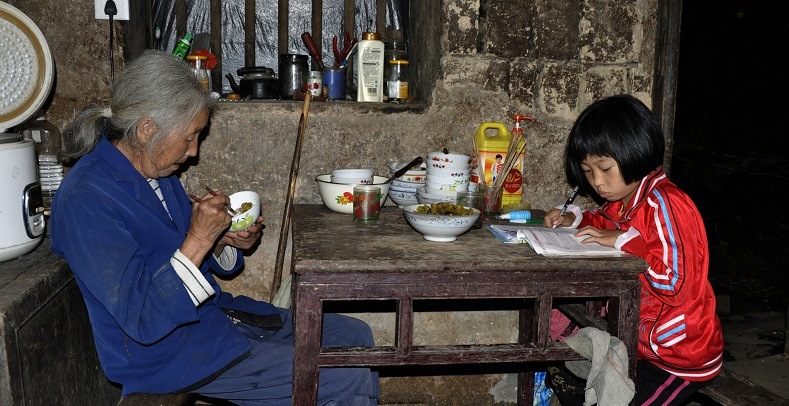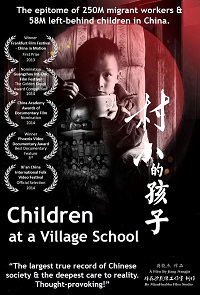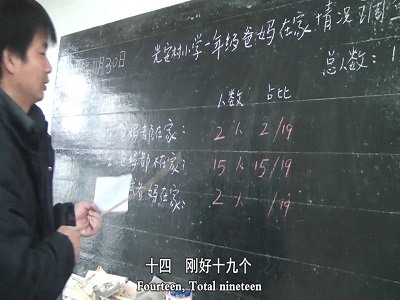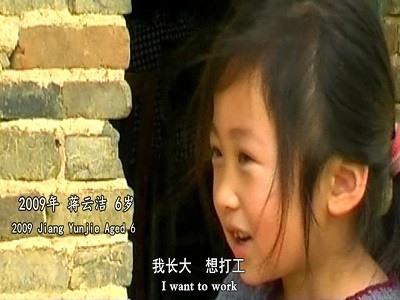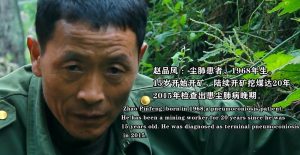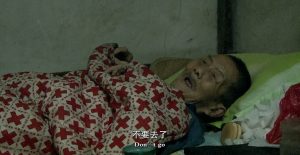Last Updated on January 15, 2021
The problems of left-behind children and migrant workers caused by the urban-rural dualistic system are enough to make people deeply reflect on the serious disregard of fairness and justice under the principle of efficiency first.
Jiang Hai Yi Suo Weng
We translate the local audiences’ reviews about issues presented in the film into English when possible. In this way, you can take a look at what local people think about these issues and have in-depth understanding about them. The number besides the reviewer represents how many upvotes a comment/review has received.
Warning: spoilers may apply. To ensure the best viewing experience, we suggest that you watch Children at a Village School first and subscribe now for 20% OFF.
Short Comments
Looking at our back waves, do they have many choices?
-Ying En (129)
My yesterday, their today. And the saddest thing is that all of us know what the future of most of them will be. #A kind of reality in China#
-Lu Ga Wei Jia (91)
Alas, the money for two turf at the Bird’s Nest is enough to build a new school for these children.
-Xian Yun (75)
The problems of left-behind children and migrant workers caused by the urban-rural dualistic system are enough to make people deeply reflect on the serious disregard of fairness and justice under the principle of efficiency first.
-Jiang Hai Yi Suo Weng (53)
The problem of left-behind children is a problem of the whole social ecology and economic structure. The family education of the Chinese people is all about power, tears, threat, and sensationalism. There is little calm rationality, peace and sensibility. For example, “If you don’t listen…” and “Mom and Dad are working so hard for you…”.
-Trouble (40)
The substitute teacher frets about becoming a regular teacher, the village head frets about rebuilding the primary school, and the old man frets about the children studying in town. How should I put it, to put it plainly it is the economic reason. Poverty and backwardness, generation after generation, in an endless cycle without improvement. However, can’t this problem really be solved? Can’t we really improve more?
-Xia Fan Cai (31)
The school is in the town next to my grandfather’s house. Even some of these students are more or less related to me by blood. It is sad to hear the familiar accent. I thought of the time when I took a ride to my hometown by myself. There were good mountains, rivers and good people, but there were no basic educational resources. My grandfather returned from Beijing and spent his whole life as a village teacher, which changed the fate of some people. But education should not be put in charge by certain people. Who is willing to be a substitute teacher for a lifetime and get that meager salary? To put it bluntly, he can’t even feed himself.
-YorkeeJay (18)
Left-behind children are still the norm nowadays. There is always a gap between the parents who live in the city and the children who remain at home. They give too little love and carry too much burden on their shoulders. Parents may be just a title for many left-behind children, and those kids even have no idea what they look like in their minds. The alienated feelings and the ignorance of the elderly make education sound like a joke. Occasionally there are considerate children, but they are actually very worried.
The poverty alleviation and construction projects are more like a joke. The new school building is scrawled and the ribbon is cut in front of a playground full of construction waste. All the people are hypocritical and self-deluded, except for the untreated bricks and mortar which are the most authentic. And the college students who volunteered to help, even if they are leeks*, there are always people willing to help the seeds break out of the soil.
-Shao Nian Wei Chi De Fan Nao (5)
*This is a popular vocabulary in Chinese online discussions, derived from stock market slang. It shows that ordinary citizens are “harvested” into tools and economic slaves, and can be easily cut into the shape that the government and big capital want them to become—just like leeks.
Now those children who were still childish in front of the camera should be 17 or 18 years old now. I don’t know which of them walked into the golden ivory tower and which walked into the aluminum alloy gate of the factory. I’m wondering whether the number of nearly 60 million left-behind children is increasing or decreasing. I have no idea if the ugly faces of those officials still show up on the road of targeted poverty alleviation. I don’t know whether the playground of the teaching building in the village primary school is still muddy.
-Fu Shi Xin (3)
I grew up in the countryside too, and luckily there was no mass migration in my village when I was a child. But now, some of my cousins are left-behind children… It’s too real and so sad.
-DURA (2)
58 million left-behind children will be a considerable crowd in the future. They are neither economically nor emotionally comparable to the majority of children in society. I hope that when they become adults, the society will be more developed and fair, and they don’t have to repeat their parents’ work destiny.
-SSC (2)
After seeing the film marked “600 million people’s monthly income is less than 1000 yuan”, I feel that comprehensive well-off society is still far away from today’s China. The abundance and convenience that everyone living in the city feels should belong to the survivor’s bias.
-Bao Pi Qi De Tang Zhua Zhua (1)
However, the children in the documentary have difficulty in going to school due to reckless blind “school merger”. With the advancement of urbanization, farmers have “lost their land” and moved to the city. They are alienated into migrant workers and their living conditions have declined rather than improved. If left-behind is a state of life, most of it is bad, not nothing, but a huge social problem.
-Shelduo (1)
Education is a very long process. If you want to change a child and only rely on the school, himself, parents and family, and volunteers, it will not be enough. The environment is really important. And the most terrifying thing is that we have not done anything yet, we are already moved by ourselves. To be honest, I didn’t feel it when I saw the volunteers, and I also didn’t feel it when I saw the children say “mom and dad I love you.” This is like a black hole and a strange circle. A wave of people come to shoot and another wave of people come to express their condolences.
What can these change? If there is no real care for the improvement of the entire bottom-level ecology, for farmers, village development, left-behind children, migrant workers’ treatment in cities, etc., this is the situation that village children will never get out of.
-Xiao Xing Xing Bian Zou Qu (1)
It’s not that these children don’t like to learn, but they never know the importance of learning, and they don’t know what the bigger world is than being migrant workers.
-Abigail (1)
The people who have paid so much for China’s economy are living in misery. The government has been invisible from beginning to end in this suffering that has been going on for generations. There will always be migrant workers. How to make these workers have dignity and their descendants can obtain the most basic education is the real question to think about.
-aryahardy (1)
Source: Douban
Psychological Problems of Left-Behind Children
Most left-behind children live in rural areas in central and southern provinces, with Sichuan, Anhui, Henan, Guangdong, Hunan and Jiangxi accounting for 52 percent of the country’s total. More than 30 percent of these left-behind children have psychological problems.
Suicide Problem
2008, a teenager in Anhui committed suicide because he missed his parents. 2009, left-behind female high school students committed suicide by burning charcoal. 2010, four left-behind children committed suicide by drinking drugs together, and there were another three and two such children in 2011 and 2013. 2012, a left-behind peasant woman and her three children committed suicide by taking poison. 2014, a 9-year-old boy in Anhui Province hanged himself on holiday after hearing that his working mother would not go home for the Spring Festival. 2015, four left-behind children in a family in Bijie committed suicide by taking drugs.
Illegal Criminal Activities
Since 2000, the number of juvenile delinquents with effective judgments by courts at all levels in China has increased by an average of about 13% each year. Among them, the problem of “left-behind children” has become a phenomenon that cannot be ignored in China’s juvenile crimes.
Don’t Let Your Mercy Ruin Them
The Suffering of Left-Behind Children
It’s undeniable that both left-behind children and rural life are suffering. However, the suffering of left-behind children does not lie in the difficult material environment and premature participation in agricultural labor. The real suffering is the lack of parental company and the absence of education. This is very different from the imagination of city people.
Change or Destroy?
Some people say that this is a state of life and it’s nothing. The problems reflected by left-behind children may just follow the traditional concept. When I was in college, I also held a “crow feeding back” mood and rushed to carry out volunteer teaching activities in various mountainous areas during winter and summer vacations. Our club was called “going to the countryside” for short.
At first I thought I could change a lot, but later I felt more and more cruel about this kind of supportive education activities for college students to go to the countryside. We showed the prosperous city life to the innocent children in the mountainous area, encouraging them to yearn for another kind of life, without thinking about how many of them are truly able to get there. At this step, how many people lost their sense of reality because of the dizziness caused by this look, and lived in despair ever since?
Empathy or Compassion?
And more importantly, do we have enough qualifications to make a superior judgment for every kind of life? Is a rich city life really better than a quiet rural life? Is the productivity improvement brought about by advanced technology really more advanced than the small peasant society of men farming and women weaving? Why are generations of people molded into the same group of humans who have only one imagination for life?
Why can we, who have lost imagination and tolerance, intervene in the life of another generation in a reckless condescending manner, especially for these naive children who have not yet made their own mature judgments? How come we can’t build a garden with infinite possibilities first?
What do you want to do when you grow up? Has this society become a society that only allows children to choose to become a migrant worker?
With the rapid development of society today, China has become the second largest economy in the world. Everywhere can hear or see the news of how fast the country is developing and becoming stronger. Why isn’t there anyone caring about these flowers of the motherland? What’s the point when we can’t even keep up with the most basic education? Obviously these children have become victims of the development of this society.
Care for Left-Behind Children
Director Jiang said he did not see much hope in the recorded phenomena. While some people have become rich by exploiting the poor, China’s development has also caused the poor families and the next generation to pay a heavy price for lack of care and education.
Learn more about this documentary by reading this article written by Director Jiang.
It is true that we can do too little. The easy thing is to call attention to this group, but what happens after that? Can it change anything? School teachers and economists are calling for low-rent housing, subsidies to contribute to the possibility of migrant workers raising their children nearby. But is it really possible?
In the film, the newly built teaching buildings are of poor quality and the builders are irresponsible. China is corrupt. The gap between rich and poor is widening. The poorer the weaker, the richer the stronger. How can Chinese society develop healthily and how can people at the bottom of the society live a better life? This is a headache for people. Education can change destiny, but how to let them receive good education? Because of poverty, education has become a luxury.
Make the Wait No Longer Long
The problem of left-behind children is a prominent social problem in recent years, and this phenomenon is generally only mentioned in China. Due to the rapid development of modernization, a large number of surplus labors in rural areas have gradually moved to cities. As a result, now in some remote mountain villages, only the old people and their grandchildren are left to live together. They should be the jewels in the palm of their parents, but they can only drink their sorrows alone in the lonely and sleepless night. Besides, they can only use the bright moon to express their feelings for the distant parents.
According to authoritative surveys, the number of “left-behind children” in rural China exceeds 58 million. 57.2% of the left-behind children have one parent out, and 42.8% have their parents out at the same time. 79.7% were raised by grandparents, 13% were entrusted to relatives and friends, and 7.3% were uncertain or unsupervised. In order to make a living and provide a good study and living environment for their children in the future, parents choose to move to cities. However, because they can’t afford the exorbitant cost of city living, they are forced to be separated from their children. The left-behind children in the growing period may be vulnerable to damage from the outside because their parents are not close to take care of them.

